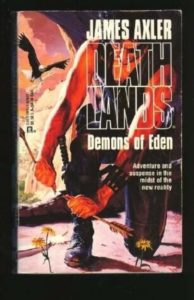 I know I was just complaining about how these Deathlands books are just extruding titles now, but maybe someone else thought the same thing lo these 27 years ago? Because Demons of Eden is basically on the nose. I could wish the editors were better about paying attention to character continuity now that there are multiple authors, or for that matter about scene continuity within a single volume.
I know I was just complaining about how these Deathlands books are just extruding titles now, but maybe someone else thought the same thing lo these 27 years ago? Because Demons of Eden is basically on the nose. I could wish the editors were better about paying attention to character continuity now that there are multiple authors, or for that matter about scene continuity within a single volume.
And I could especially wish the books had not suddenly remembered their genre and started turning all male gazey. 38 books in, plus owning all of them, I’m not likely to stop now. But I miss being able to recommend them with almost no reservations[1], back when they were subverting the expectations of their audience instead of pandering to it, and back when there was a little more science in my speculative fiction.
But my original point was that at least the plotting is a bit more interesting and on track and acting like it and the title are related, which is not nothing. This time, our heroes tackle ancient Sioux and conquistador legends about lost cities of gold, which might also hold the key to undoing a century of nuclear damage to the entire planet. But if the only way to reach that end is to despoil one of the last idyllic locales in the post-holocaust world, is it worth it?
In conclusion, ley lines and Gaia and leaning more into earth-based fantasy plotting is all well and good, but I miss when the characters were jumping into government funded teleporters all the time.
[1] Way too detailed about guns in use, which is its own kind of uncomfortable in these fallen times, and some pretty explicit violence on the regular. But otherwise? A+, for a long run of books.
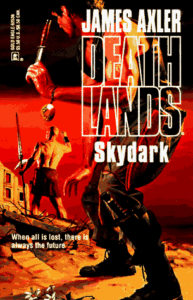
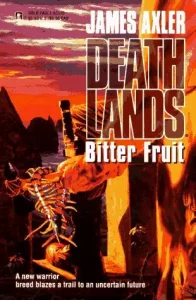

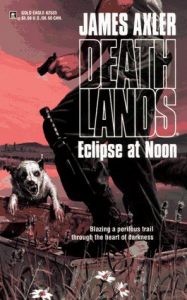 A thing you would have no real reason to remember:
A thing you would have no real reason to remember: 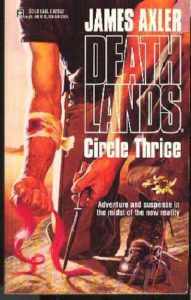 Nearly a year since the last Deathlands. Oops? But between a global pandemic and a new son, I’ve had things going on. …boy howdy. Things.
Nearly a year since the last Deathlands. Oops? But between a global pandemic and a new son, I’ve had things going on. …boy howdy. Things.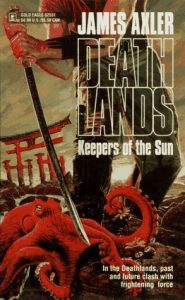 This week in the Deathlands, our heroes… are not in the Deathlands, actually. See, for the past three to five books, there have been hints of circa 17th C samurai that have been using the same teleportation gateways that our band of semi-heroes have been using to travel around the post-apocalyptic remains of what was once the United States. (So, y’know, near future sci-fi.) All of which to say, this time they come out in Japan!
This week in the Deathlands, our heroes… are not in the Deathlands, actually. See, for the past three to five books, there have been hints of circa 17th C samurai that have been using the same teleportation gateways that our band of semi-heroes have been using to travel around the post-apocalyptic remains of what was once the United States. (So, y’know, near future sci-fi.) All of which to say, this time they come out in Japan!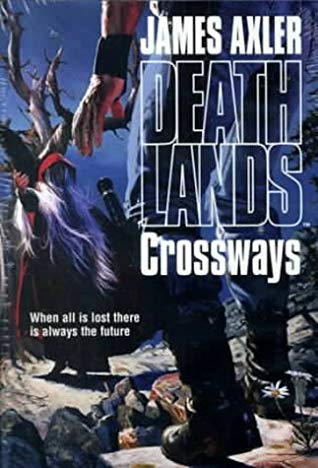 As usual, a weekend in the woods means another Deathlands book[1]. I don’t have a lot to say about it, because it was extremely transitional. Also because reviewing these is starting to feel a little like reviewing individual issues of comics? I think the latter is more true because this one was transitional. Like, when you have a really good four to six issue Spider-Man or Avengers run, and they’ve set up hints about what will happen next that’s big, but in between there are a couple of episodic villain of the week bits, with maybe two panels each dedicated to “no really, the next story is about to happen”? This is that but in book form.
As usual, a weekend in the woods means another Deathlands book[1]. I don’t have a lot to say about it, because it was extremely transitional. Also because reviewing these is starting to feel a little like reviewing individual issues of comics? I think the latter is more true because this one was transitional. Like, when you have a really good four to six issue Spider-Man or Avengers run, and they’ve set up hints about what will happen next that’s big, but in between there are a couple of episodic villain of the week bits, with maybe two panels each dedicated to “no really, the next story is about to happen”? This is that but in book form.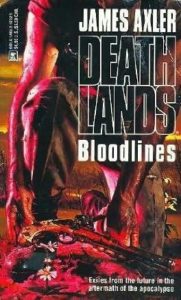 I know mostly all I do is complain about being behind and/or working constantly. But here’s my point. I read another Deathlands book, right? This is the book I take camping because I might finish one or two over a long weekend, all while helping with a giant fireworks show plus explosion, and also getting up to who knows what all manner of shenanigans. (I mean, I know, but this is a public forum, of however limited readership.)
I know mostly all I do is complain about being behind and/or working constantly. But here’s my point. I read another Deathlands book, right? This is the book I take camping because I might finish one or two over a long weekend, all while helping with a giant fireworks show plus explosion, and also getting up to who knows what all manner of shenanigans. (I mean, I know, but this is a public forum, of however limited readership.) I haven’t read anything but comics in about a week, because I’m behind on this book review. The irony is, of course: in what world am I worried about the quality of a Deathlands review that nobody cares about?
I haven’t read anything but comics in about a week, because I’m behind on this book review. The irony is, of course: in what world am I worried about the quality of a Deathlands review that nobody cares about?